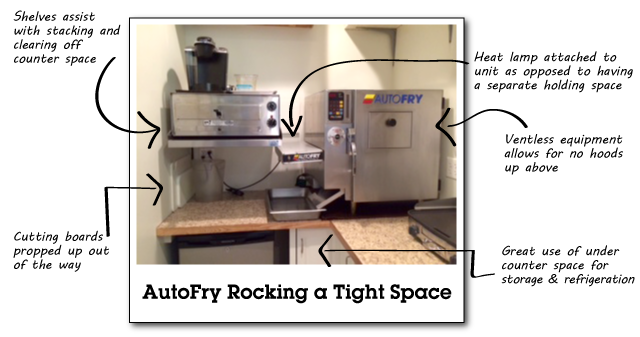Contact Us
1-800-348-2976
sales@mtiproducts.com
Ventless Revolution

Making the Most of a Small Kitchen Space
 Foodservice has greatly evolved over the last ten years. From actual offerings to whose offering it we’ve evolved into a constant feeding frenzy – none of which I am complaining about. As a generation of busy people, we’ve come to expect food at every corner so we can grab it exactly when we need it. All this evolution in ready made food has brought forward an interesting and sometimes challenging trend: small kitchen spaces. Across the globe, foodservice operators are looking at new and different ways to make their small commercial kitchen space work for their business. Today we’re going to look at some of the ways you can maximize your small kitchen space and make more with less space.
Foodservice has greatly evolved over the last ten years. From actual offerings to whose offering it we’ve evolved into a constant feeding frenzy – none of which I am complaining about. As a generation of busy people, we’ve come to expect food at every corner so we can grab it exactly when we need it. All this evolution in ready made food has brought forward an interesting and sometimes challenging trend: small kitchen spaces. Across the globe, foodservice operators are looking at new and different ways to make their small commercial kitchen space work for their business. Today we’re going to look at some of the ways you can maximize your small kitchen space and make more with less space.
 This is an ‘easier said than done’ type of task, but one that should be carefully completed by small kitchen operators. If there is something in your kitchen that you don’t love, or more importantly USE, you should probably get rid of it. You don’t have to throw it away necessarily, but consider placing it in storage outside of your precious small kitchen space.
This is an ‘easier said than done’ type of task, but one that should be carefully completed by small kitchen operators. If there is something in your kitchen that you don’t love, or more importantly USE, you should probably get rid of it. You don’t have to throw it away necessarily, but consider placing it in storage outside of your precious small kitchen space.
The great Alton Brown once said, “the only uni-tasker allowed in my kitchen is a fire extinguisher.” You too should be designing a kitchen with this principal in mind, you want kitchen equipment and tools that offer more than just one application. Keep an open mind when you ask yourself how each tool in the kitchen can work double time, sometimes tools can double up in ways you hadn’t imagined.
 If you can’t move out, move up. What do I mean by that? Using every ounce of space on your wall and under cabinets. Shelving, magnetic strips, hooks on the walls, stackable equipment, all these things can help you to use more of your vertical space. If you frequently use cutting boards, consider mounting L shaped slides under your counters for storage below.
If you can’t move out, move up. What do I mean by that? Using every ounce of space on your wall and under cabinets. Shelving, magnetic strips, hooks on the walls, stackable equipment, all these things can help you to use more of your vertical space. If you frequently use cutting boards, consider mounting L shaped slides under your counters for storage below.
Magnetic strips are a great way to store knives and smaller items that can have magnets added to them, like spice jars. If you don’t have a lot of floor space, consider countertop equipment, or better yet, countertop equipment that is stackable. Equipment has really evolved in favor of the smaller kitchen so be sure to look at all your options to find a size that will work best for you.
 The fancy French way of saying, set up in advance. How does Mise en Place help a small kitchen space? If you’ve prepped things in advance, like chopping all your veggies, having sauces and broths ready and waiting, garnishes ready to go, they can be stored out of the way for when you’re actually cooking.
The fancy French way of saying, set up in advance. How does Mise en Place help a small kitchen space? If you’ve prepped things in advance, like chopping all your veggies, having sauces and broths ready and waiting, garnishes ready to go, they can be stored out of the way for when you’re actually cooking.
You might want to use the kitchen sink with a cutting board over it as your place for cutting veggies, or perhaps you prepare a broth on the stove top that’s normally reserved for pan-seared rib-eye, in both instances you are prepping in an area that will be occupied later when you’re in the thick of your dinner rush. Mise en place, or careful planning and prep, can really help you to cut down on kitchen space in the long run.
 One common issue when designing a small kitchen space is that flow becomes disrupted. Sure you get the most room by putting the spoons on the opposite side of the kitchen from the stove, but if you have to walk away to grab a spoon every time you want to add broth to your stove top chicken plate, you’re going to be wasting time and disrupting the kitchen flow.
One common issue when designing a small kitchen space is that flow becomes disrupted. Sure you get the most room by putting the spoons on the opposite side of the kitchen from the stove, but if you have to walk away to grab a spoon every time you want to add broth to your stove top chicken plate, you’re going to be wasting time and disrupting the kitchen flow.
Try an work with open space in the center of your kitchen and keep the most used equipment and tools around it within an arm’s reach. Be flexible and test things out, if things don’t work out at first, tweak set up and retry until you reach kitchen peace.
As a ventless kitchen equipment manufacturer, we get a lot of requests for assisting in small kitchen space solutions. Perhaps one of the tightest kitchen layouts we've ever seen comes from P-2's Irish Pub in New York. This small bar turned pub holds one of the tightest AutoFry set ups we've ever seen! Check it out below and see why their space works.





